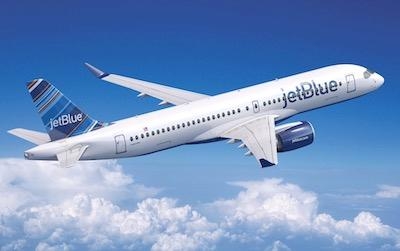Releases Annual Environmental Social Governance (ESG) Report
JetBlue has released its annual environmental social governance (ESG) report detailing the airline’s long-term emissions and climate risk management strategy, among other topics.

Concentrating on areas important to investors, this year’s report was crafted according to SASB standards for the airline industry and recommendations for financial and climate-related risk disclosures from TCFD. The report details JetBlue’s long-term strategy – mitigating ESG risk, investing in more fuel-efficient aircraft and technology and fueling the aviation talent pipeline of the future.
“Reducing emissions and mitigating climate risk are critical as we evaluate the future of our business and industry,” said Sophia Mendelsohn, head of sustainability and environmental social governance, JetBlue. “Investments in new technology such as the Airbus A220 to replace older aircraft and the A321neo will help reduce our CO2e emissions per seat by up to 40 percent. This in turn will lower our operational costs over time. Tuning into and acting on social and environmental trends and their benefits and implications are key to ensuring our business future.”
Highlights from this year’s ESG report include:
- Emissions Mitigation – Since 2008, JetBlue has purchased more than 2.3 billion pounds of CO? offsets to reduce its overall greenhouse gas emissions from flying. To reduce emissions, JetBlue is focused on operational changes such as fuel-efficient flying and larger scale, long-term infrastructure investments such as fuel saving technology and renewable jet fuel.
To tackle ground emissions, JetBlue is converting its fleet of owned conventional ground support equipment (GSE) to electric alternatives (eGSE). Later this year, JetBlue will introduce 118 electric baggage tractors and belt loaders at JFK Airport. eGSE vehicles reduce energy costs, emissions and noise and increase ground operations safety. In this report, JetBlue also announced its first electric GSE goal of 40 percent electric GSE by 2025 and 50 percent electric by 2030.
- Fuel Efficiency – JetBlue will introduce more fuel-efficient new engine options (NEO) in 2019 and the A220 aircraft to its fleet in 2020. The A321neo boasts an estimated average of 15 percent lower fuel burn and a reduction of CO2e emissions, compared to the existing engine model. Each A321neo will be powered by two Pratt & Whitney GTF engines, which produce a smaller noise footprint and lower operating costs when compared with today's engines.
Additionally, in 2018 JetBlue announced an order for 60 Airbus A220-300 aircraft for delivery beginning in 2020. The A220 delivers improved fuel efficiency by an estimated 40 percent per seat and an equivalent reduction in carbon emissions. These combined technology investments will bring significant fuel, carbon and cost-savings.
- Fueling the talent pipeline – JetBlue is proactively establishing its talent pipeline by making the industry accessible to a more diverse candidate pool. JetBlue actively seeks pilot candidates though a variety of Gateway programs including paths for aviation students, aspiring aviators without previous experience and crewmembers seeking to transition from other aviation careers to the cockpit.
Less than seven percent of pilots are women and people of color account for less than 13.7 percent of pilots and flight engineers. With these statistics in mind, JetBlue and the company sponsored JetBlue Foundation are fueling the talent pipeline by supporting educational initiatives and science, technology, engineering and math (STEM) programs today to help ensure more diverse perspectives are present in the cockpits, hangars and boardrooms of the future.
In 2018, JetBlue became the first airline and one of the first U.S. publicly traded companies to incorporate SASB disclosures in its ESG reporting. JetBlue was also one of the first companies to introduce voluntary climate-related disclosures recommended by the TCFD. TCFD is designed to improve market understanding and analysis of climate-related risks and opportunities through disclosure recommendations that are useful to stakeholders in understanding material risks.
JetBlue’s Commitment to Environment and Social Issues – JetBlue communicates transparently about climate change and depends on natural resources and a healthy environment to keep its business running smoothly. JetBlue continuously investigates ways to mitigate climate risk exposure, improve operational efficiency and reduce its environmental impact.
(Source: JetBlue news release. Image from file)
 ANN's Daily Aero-Term (12.01.25): Convective SIGMET
ANN's Daily Aero-Term (12.01.25): Convective SIGMET ANN's Daily Aero-Linx (12.01.25)
ANN's Daily Aero-Linx (12.01.25) NTSB Final Report: Remos Aircraft GmbH Remos GX
NTSB Final Report: Remos Aircraft GmbH Remos GX Aero-News: Quote of the Day (12.02.25)
Aero-News: Quote of the Day (12.02.25) ANN's Daily Aero-Term (12.02.25): Coupled Approach
ANN's Daily Aero-Term (12.02.25): Coupled Approach



